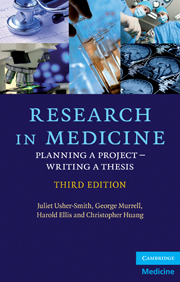Book contents
- Frontmatter
- Contents
- Preface
- 1 Introduction
- 2 Deciding whether to do research
- 3 Deciding when to do research
- 4 Selecting a research degree
- 5 Choosing a department, research supervisor and project
- 6 Applying for research positions and funding
- 7 Getting started
- 8 Overcoming frustration
- 9 Writing scientifically
- 10 Publishing a paper
- 11 Attending scientific meetings
- 12 Writing a thesis
- 13 Submitting a thesis and preparing for the viva voce examination
- Further reading
- Appendix: Information for research students wishing to study overseas
- Index
11 - Attending scientific meetings
Published online by Cambridge University Press: 05 May 2010
- Frontmatter
- Contents
- Preface
- 1 Introduction
- 2 Deciding whether to do research
- 3 Deciding when to do research
- 4 Selecting a research degree
- 5 Choosing a department, research supervisor and project
- 6 Applying for research positions and funding
- 7 Getting started
- 8 Overcoming frustration
- 9 Writing scientifically
- 10 Publishing a paper
- 11 Attending scientific meetings
- 12 Writing a thesis
- 13 Submitting a thesis and preparing for the viva voce examination
- Further reading
- Appendix: Information for research students wishing to study overseas
- Index
Summary
Scientific meetings and conferences provide formal opportunities for researchers to get together and exchange information on a pre-defined subject or area of knowledge. They are also the ideal environment in which to develop your presentation skills. Application forms for clinical jobs are increasingly including sections for presentations, particularly at national and international audiences, and so a track record of presenting data has become an important part of career progression. Many of the larger conferences also publish the abstracts which can be beneficial for grant or other funding applications.
In general, the advantages of attending a meeting include:
making contact with, and gaining recognition from, other researchers in your field;
securing priority for your work by presenting it at a defined date;
getting practice in presenting work, and answering criticisms and questions (particularly useful for your approaching oral examination on your thesis); and
keeping up to date with progress in your field through contact with other participants and attending their presentations.
Choosing where to present
Within the general scope of scientific meetings, there is a hierarchy of forums at which you can display your work, ranging from informal discussion within your department to giving a paper at an international conference. These can be graded in ascending order as follows:
Seminar in your department.
Local meeting of a specialist society in your field, e.g. the London Connective Tissue Society Meeting.
National meeting of professional or academic societies, e.g. the British Connective Tissues Society.
International Conferences, covering a particular interest, e.g. International Symposium on Basement Membranes.
Major International Conferences, e.g. Gordon Conferences.
- Type
- Chapter
- Information
- Research in MedicinePlanning a Project – Writing a Thesis, pp. 97 - 102Publisher: Cambridge University PressPrint publication year: 2010



